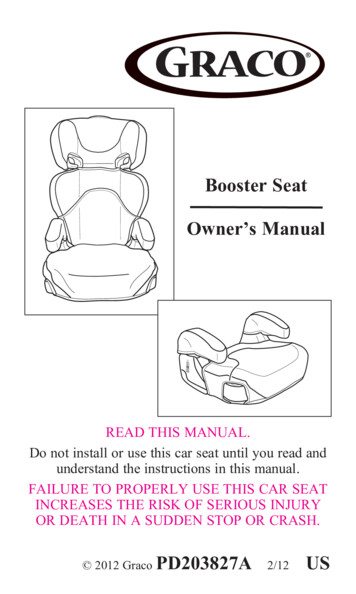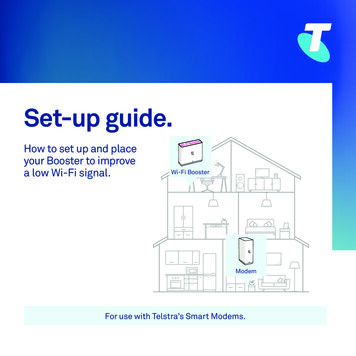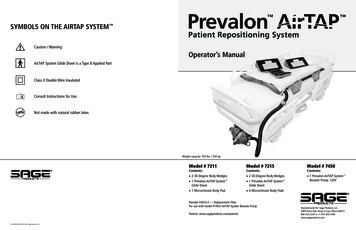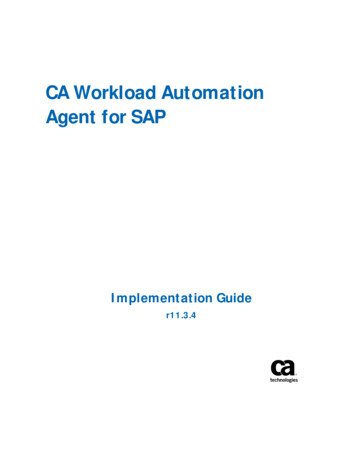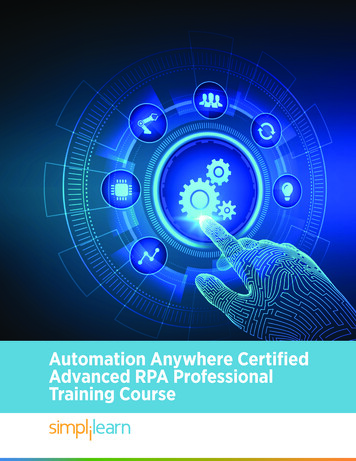
Transcription
PROCESS AUTOMATION GUIDECAREER BOOSTER
CONTENTIntroductionHow the Career Guide worksp. 3Chapter 1Process automation as a career boosterp. 4Chapter 2Dream jobs in the automation industryp. 11Chapter 3Further training opportunitiesp. 23CloseConclusionp. 312
INTRODUCTIONTHIS IS HOW THE CAREER GUIDE WORKSIn this guide, you'll find a comprehensive overview of a career in Process Automation. You willlearn why a job in the process automation industry is worthwhile and why the futureprospects in this industry look excellent.In this e-book, we also introduce you to various dream jobs that could suit you if you areinterested in Process Automation.Have fun with your Carrer Guide!3
CHAPTER 1PROCESS AUTOMATION AS A CAREER BOOSTERMore and more companies are looking at process automation in order to exploit the associatedoptimization potential.As companies automate more, more automation specialists are needed. Robotic ProcessAutomation experts in particular are in high demand, as there are currently relatively fewspecialists in this field.In the first chapter, you'll learn why career opportunities in Process Automation look great todayand will continue to do so in the future.4
CHAPTER 1The Process Automation Rocket justhas started50% market growth in the nextthree years*Reviews of software providers, such ase.g. Celonis and UiPath shoot into theheight**According to market research firm Gartner,the market for hyperautomation technologieswill reach 596 billion in 2022, up from 481.6 billion in 2020.It's the perfect time to get into the Process Automation industry!* Think Automation** Forbes*** McKinsey5
CHAPTER 1Now a career in ProcessAutomation?ArtificialIntelligenceEfficiency pressureCompanyStructuredData/CloudThe pressure on companies to be efficient is increasing all the time,which is why companies are turning to automation technologies tomake their processes more efficient and withstand the pressure. Inorder for automation technologies to be used correctly, experts areneeded who are familiar with the technologies. This is therefore aLow Code/NoCodeperfect career foundation.6
CHAPTER 1Automation pillarsAutomation and AI are changing the skills that workers need(Total: USA& 14 Western European countries)SkillsHours spent2016Physical &manual203 billionBasiccognitive115 billion General device Classic data inputoperation Classical writing,Highercognitive140 billion Creativity ComplexSkills with the Inspection &informationgreatest change incalculating andMonitoringCommunication abilityinterpretationdemand119 billion Entrepreneurship InitiativeTechnological73 billion IT Skills &Programming Leadership Classic Digital Skills24558Change ofthe spentSocial &emotional-14-15Hours until 2030 in %.Source: Skill Shift: Automation and the Future of the Workforce. McKinsey 2018.7
CHAPTER 1Dazzling growth rateThrough technologies, such as RPA, companies can work more agilely,flexibly and efficiently. As mentioned earlier, the pressure for efficiency isvery strong. Through process automation, companies can increase theefficiency of their processes and save costs by using their workforce moreeffectively.FactsAccording to a study by Grand View Research, the globalmarket for RPA will grow at a compound annual growth rate(CAGR) of 40.6 percent from 2020 to 2027. The driver of theOther reasons for the good growth rates are: Process Automation can simplify the increasingly popular remote work andreduce costs for additional employees.market growth is the increasing demand forAutomate redundant business process tasks and invest in AI andML improvements. Companies have an increased customer-centric mindset andtherefore an additional surge in demand for process automationsolutions during the forecast period. Cloud-based digital process automation services and solutions inenterprises are becoming more and more common8
CHAPTER 1Jobs without endThere are numerous possibilities for automation experts, such as working in acompany's own Automation Center of Excellence or in a specialistdepartment such as HR, Supply Chain, Finance, etc. in order to implementautomation solutions internally for the respective specialist departments.A job as an external automation expert is also possible - either in aconsulting company or as a freelancer. Tasks include, for example, settingup/maintaining Process Automation solutions or also as a job as adeveloper at an automation provider such as Automation Anywhere,Celonis or UiPath.F actsProcess automation experts are more in demand than ever.According to estimates, there are currently 5 million jobsworldwide waiting for an expert in this field - and the trend isrising.Currently, about 61 percent of RPA specialists work in-houseand 39 percent work for a consulting firm that developsautomation for customers.With the appropriate automation skills, you can also pursue your jobopportunities in process automation on a full-time or part-time basis.9
CHAPTER 1No industry/specialty restrictionCompanies in all industries rely on process automation, which is why processautomation specialists are sought after and urgently needed across all industries. The HR departments: Hiring employees, processing absences or expense reports aretime-consuming, repetitive activities that can be automated.following are some example industries, but there are many more industries whereProcess Automation provides benefits.Industries where Process Automation makes sense: Retail : Many processes can be automated. E-commerce: Process Automation makes it easy to manage changing orderand shipping statuses & update customers. Banking sector: Lengthy processes surrounding the input and exchange ofinformation can be automated.FactsBy implementing RPA, companies can typically save 20 to 30percent in costs by improving efficiency, reducing errors andimproving compliance. Insurance industry: Lengthy, multi-step claims processes anddocument-intensive workflows can be effectively automated.10
CHAPTER 2DREAM JOBS IN THE AUTOMATION INDUSTRYIn the following chapter, we will introduce you to some Process Automation jobs that mightinterest you. Since process improvement and process automation go hand in hand in manycompanies, "automation dream teams" are in demand. For this reason, automation jobs are inhigh demand.Process Automation activities range from imparting technical knowledge to the ability to identifyinefficiencies within existing processes, streamline workflows, minimize process exceptions, andreduce data silos and bottlenecks, among others.As technologies evolve, more exciting jobs will develop in this field in the near future, so stay tuned!11
CHAPTER 2The automation dream teamFinanceAutomationAgentFinance ExpertHRAutomationAutomationStrategistAutomation DeveloperAutomation ChangeManagerAutomation ArchitectAutomationAgentsAgentHR Expert12
CHAPTER 2Automation Strategist:Strategy & ManagementMain tasksMain areas of applicationThe automation strategist is not only familiar with the company's Proof of Concept: RPA is not always the method for processbusiness processes in general, but also knows and understands theautomation. There are a variety of alternative options - thislatest relevant automation and process mining technologies and knowschoice often poses a problem. The Automation Strategist helpshow to combine the two in a far-sighted manner. The hybrid use ofto avoid cost-intensive mistakes in the POC phase.different automation technologies, such as cloud automation, is just as Head of a specialist department: With the know-how of thefamiliar to him as the use of process mining tools. He is a well-connectedAutomation Strategist, department heads are empowered togeneralist and visionary who, with creativity and strongmake process automation a high-priority topic in theircommunication skills, is able to successfully orchestrate the necessaryspecialist department. Processes can then be driven forward bychange management in the respective department. He wears the hatthe Automation Strategist himself.for all automation projects of the business department and closes the Consulting firm: The Automation Strategist is ideally suited togap between the business department and a Center of Excellence as theprovide customers with a holistic picture of automation. He isexecuting organization of automation within the company.able to choose the perfect approach and technology for eachcustomer.13
CHAPTER 2Automation StrategistSkillsTech / Coding rend sense14
CHAPTER 2Automation Agent Expert in the fieldMain tasksIdeally, each department has an Automation Agent. A Finance orHR Automation Agent can, for example, be a department head, aclerk or the process owner, who usually has several years ofprofessional experience. The selected person thinks in a futureoriented way and is very familiar with the operational executionof the respective departmental processes. As a process expert witha pronounced affinity for innovative technologies, he or she isideally suited to identify the processes of a department that can beFuture prospectsAutomation-savvy companies have already installed processexperts who are responsible for optimizing processes.In the future, Automation Agents will be even more in demand, asthey are experts in certain areas and expert knowledge is urgentlyneeded in the automation process. Working as an AutomationAgent Freelancer is also attractive, as you can work in manyindustries and the daily routine always remains exciting.automated and the potential for optimization, and to submitcorresponding proposals for process automation.15
CHAPTER 2Automation Agent:SkillsTech / Coding rend sense16
CHAPTER 2Automation Architect professional for theinfrastructureMain tasksThe Automation Architect designs the necessary IT infrastructure forthe automation projects and keeps an eye on the costs for tools andExample RPA Solution Architect:Requirements and SalaryHis responsibilities include enabling the development and deploymentA good RPA solution architect takes care of the developers anddevelopers by constant monitoring and helps in troubleshooting andfixing the problems. He owns the version control and ensures that loggingof the Process Automation solution and overseeing the initial setup ofand reporting is done according to the specified requirements.technologies.the infrastructure for the development, test and productionenvironment. He is responsible for ensuring that all members of theThe earning potential is on average 62,900 per year* (gross).CoE, including stakeholders agree on the best practices to be followed.Works with the Business Analyst on the feasibility and optimization ofthe automation project, is responsible for time and cost estimation,and schedules technical meetings to be held during the process.* Stepstone17
CHAPTER 2Automation Architect:SkillsTech / Coding rend sense18
CHAPTER 2Automation ChangeManager - BridgeBuilderMain tasksEmpathy and a good senseThe Automation Change Manager carries the change initiatives fromPeople react differently to change processes and go throughthe CoE to the business departments, shares success stories and helpsdifferent phases of adaptation. Don't be surprised if you also getthe business departments with the transformation. Here, in addition tonegative reactions to the automation of certain processes. This isa fundamental understanding of automation technology and businessperfectly normal!processes, a great deal of empathy and communication skills areYour task is to respond to the different characters and phases.required.Good change management is the most effective driver forsuccessful cultural change.19
CHAPTER 2Automation ChangeManager: SkillsTech / Coding rend sense20
CHAPTER 2Automation Developer for the implementationMain tasksDesign, develop and implement software robots or bots to work withExample RPA Developer: satisfaction andsalaryhumans to improve the efficiency of business processes. Review thefeasibility of the automation or process and, if appropriate, design anddevelop the future state of that process.Bright futureA bright future awaits the Automation Developer, as processoptimization in companies is moving in the direction of completeAccording to UiPath's 2020 RPA Developer Report, 96% of RPAprofessionals are satisfied with their careers and 84% of RPAdevelopersbelieve their work as an expert will positively impact their next careermove.The expected salary is approximately between 57,168 and 73,872per year (gross).automation and thus more and more needs to be automated. Thismeans experts are currently very much in demand - and the trend isrising.* Stepstone21
CHAPTER 2Automation Developer:SkillsTech / Coding rend sense22
CHAPTER 4FURTHER EDUCATION OPPORTUNITIESIf you're thinking about taking your chance in process automation, you don't necessarily have toalready have basic technical skills to improve your career prospects.With the tremendous growth potential of process automation and the demand for suitableautomation professionals, RPA training providers have mushroomed. Their mission is to train thosewho want to adapt their knowledge to this evolving market.The range of training courses on offer is as diverse as the number of providers, but they don'talways deliver what they promise in terms of quality. That's why, in the fourth chapter of this ebook, we introduce you to training providers you can rely on!2323
CHAPTER 4Continuing education – Whatyou should pay attention to!Automation technologies have a very high pace of innovation. Mostcompanies expect candidates for an RPA position to have aTipminimum education, but even better a recognized certification,which can be obtained in a good advanced training.Automation Academies offer efficient 360 training witha lot of content and practical use of new tools andGood training programs should include the following:methods that go beyond classic webinar and online State-of-the-art learning technologies and methods, with atraining forms, thus taking into account the hybrid use ofholistic technological perspective to build the necessarydifferent automation technologies.competencies for automating processes. On the one hand, an effective training plan builds on the latestscientific learning methods; on the other hand, it also takes intoaccount strategies that combine a high level of motivation tolearn, the sustainable transfer of knowledge and the use of state-of-the-art technologies.24
PORTFOLIO MODULEAUTOMATION POOLA1Automation HistoryB1Process DesignA2Automation OverviewB2Automation LifecycleA3Process UnderstandingA4Automation in companiesA5A6C1 Economic relevance of AutomationC2The Automation MarketB3 Automation Lifecycle in practiceC3Automation StrategyB4Benefits & KPIs of an automationprojectC4Automation InitiativeData & AutomationB5Tools & TechnologiesC5Automation InfrastructurePractical Automation ExamplesB6How To Tell & SellC6Future of Automation25
MODULE OVERVIEWAUTOMATION STRATEGISTC1 Economic relevance of AutomationD2C2The Automation MarketD3 Automation Infrastructure (Tech)D1Tools & CapabilitiesC3Automation StrategyC4Automation InitiativeD4Governance & PoliticsD5Kick Off: Own CaseChange Management26
LEARNING PATHAUTOMATION STARTERRecommended LearningPath:Description:On this learning path you will get to know what automation means and how the worldof automation has developed in the recent years. Get an insight into the history ofA1Automation Historyautomation and a current market overview. Understand what exactly processes areand how different automation processes merge inside the company. The organizationA2Automation OverviewA3Process UnderstandingA4Automation in companiesA5Data & AutomationA6Practical Automation Examplesand the different roles in the company will also be addressed. In addition, we willpresent various practical examples from real companies.Total duration: 4 - 5 hrsNo previous experience necessaryPerfect for anyone who wants to build a basic understanding of the topic ofautomationIncluded in Membership EssentialOwn Discord Channel and regular Q&A sessions27
LEARNING PATHAUTOMATION AGENTRecommended LearningPath:Description:Learn how to identify and leverage automation potential. Implement your ideas in aprocess model, understand the flow of an automation project and calculate the KPIsB1Process Designand the business case. Get an overview of the common technologies and tools on themarket and learn how to make the right choice for your process. Also, learn how toconvince other stakeholders of the potential of your automation project.B2Automation LifecycleB3Automation Lifecycle in practiceTotal duration: 10 - 15 hrsB4Benefits & KPIs of an automationprojectBasic automation knowledge requiredB5Tools & TechnologiesB6How To Tell & SellPerfect for anyone who wants to identify automation potential and take it to thenext levelIncluded in Membership EssentialOwn Discord Channel and regular Q&A sessions28
LEARNING PATHAUTOMATION FOR LEADERSRecommended LearningPath:Description:Understand what process automation means, what an automation mindset entails, andhow to set up the right automation strategy for your team. Learn about the fullC1 Economic relevance of Automationlifecycle of an automation project and what steps need to be taken to be successful.Get first-hand knowledge from automation experts and learn about the do's andC2The Automation MarketC3Automation StrategyC4Automation Initiativedon'ts in the automation game.Total duration: 4 - 5 hrsPerfect for anyone who wants to be a pioneer in the automation gameIncluded in Membership EssentialC5Automation InfrastructureC6Future of AutomationExclusive Leadership Discord Channel incl. events (access on request)29
COURSE OVERVIEWAUTOMATION STRATEGISTDescription:Deepen your knowledge from the previous learning paths and get deeper insights in the tools and technologies. Learn more about thecurrent automation market, which licensing models are available and which future prospects the topic of automation brings. Divedeeper into the topics of governance, change management and decision matrix and gather the know-how to successfully lead anautomation project in the company.The focus is more on the strategic considerations; operational use cases are only addressed on the side.Total duration: 30 - 45 hrsAll modules included in Membership ProStrategic orientation of the contentFlexible learning times, no live touchpointsExclusive Community Channel30
CLOSECONCLUSIONIf any of these jobs appeal to you, the automation industry interests you, and you enjoyevaluating, analyzing, and optimizing business processes, then you should consider aProcess Automation career!According to the Emerging Jobs Report 2020, the annual growth rate for RPA jobpostings is a whopping 40% - so there's a good chance there's a job for you. Newinnovations and technologies in process automation are also creating numerous careeropportunities. In addition, compensation is expected to be 30% higher than other jobs inthe IT industry.Since RPA, as well as AI or machine learning, are emerging technologies, now is theperfect time to invest in your career, whether with an apprenticeship, degree orcontinuing education.So take the plunge and become a Process Automation Expert!31
Your Job issafe;your role isnot!32
WANT TOLEARN MORE?Learn more
automation solutions internally for the respective specialist departments. A job as an external automation expert is also possible - either in a consulting company or as a freelancer. Tasks include, for example, setting up/maintaining Process Automation solutions or also as a job as a developer at an automation provider such as Automation Anywhere,
